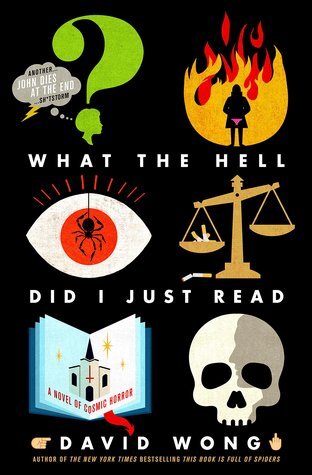Almost ten years ago, someone recommended I read a horror-comedy web serial called John Dies at the End, the opening paragraph of which read:
Solving the following riddle will reveal the awful secret behind the universe, assuming you do not go utterly mad in the attempt. If you already happen to know the awful secret behind the universe, feel free to skip ahead.
About a page later came this exchange:
“Dave? This is John. Your pimp says bring the heroin shipment tonight, or he’ll be forced to stick you. Meet him where we buried the Korean whore. The one without the goatee.”
That was code. It meant “Come to my place as soon as you can, it’s important.” Code, you know, in case the phone was bugged.
“John, it’s three in the—”
“Oh, and don’t forget, tomorrow is the day we kill the president.”
Click.
He was gone. That last part was code for, “Stop and pick me up some cigarettes on the way.”
Thus hooked, I devoured the contents whole. And it was a good thing too, because later that year author David Wong1 took it all down, presumably to promote its sale as a physical book. But John Dies at the End belies its origins as an internet serial. It’s not really a cohesive novel, but that’s a big part of what’s so fun and fresh about it – you never know what’s coming next, and the plot keeps twisting in stranger and stranger directions.
Memorable moments and horrific images abound throughout – the protagonist’s first experience with the supernatural drug known as Soy Sauce, the fate of Todd Brinkmeyer, the warped picture of Ronald McDonald, the scene in the toolshed, and the utter bizarreness of book’s climax are just a few that have stuck with me.
By contrast, I struggle to recall anything about the sequel, This Book is Full of Spiders, apart from that it’s structured a lot more like an actual novel. At the time Spiders came out, I liked to compare the two books to the games Portal and Portal 2 – Portal 2 is a fine game, longer and richer in depth than its predecessor, and maybe a better game on some axes. But Portal itself was so ground-breakingly original and utterly unexpected (especially in its final levels) that it will always be the more important, memorable and influential of the two.
But now that it’s been a few more years since I’ve read both, I’m inclined to take an even dimmer view of Spiders because I can’t remember a single quote or image or even a vague outline of the plot, whereas John Dies is still imprinted on my brain.
Which brings us at last to the point of this review: the recently released third book in the series, What the Hell Did I Just Read.

What the Hell Did I Just Read is an improvement on its immediate predecessor. In stark contrast to Spiders’s fairly rote zombie narrative, which almost felt like it could have been entirely unrelated to John Dies, What the Hell takes us right back to the first book’s core horror conceit and really digs into it. It doesn’t have the explosive originality or unpredictability of the first book, but that’s sequels.
That core horror conceit is the idea is that human beings don’t perceive reality as it is, but rather in a way that’s evolutionarily useful. There could be unspeakable horrors all around us that we just don’t notice because the ability to do so has been bred out of us. When the protagonists John and Dave ingest the supernatural drug called Soy Sauce, it grants them the ability to see these unspeakable horrors, enabling them to become the world’s least competent ghostbusters.
The first book took this idea in all sorts of different directions, but in this one it’s focused around a specific threat that takes direct advantage of this weakness of human perception. It’s a smaller but deeper story, with just enough seriousness mixed into the humour.
The book’s subtitle is “A Novel of Cosmic Horror”, and there are attempts here and there to bring in those elements, but they come off for the most part as a bit half-hearted and are often undermined by the series’s trademark humour. In the few places where Wong touches directly on the mental effects of the book’s main antagonist he’s quite brief and vague, telling rather than showing.
Like Spiders, What the Hell tries to have narration both ways by having the story told in the first person by David, interspersed with bits in third person from the other two main characters’ perspectives. These interludes were included sparingly in Spiders, but make up at least half of What the Hell’s length. While this does lead to some amusing recurring jokes – John’s sections are rife with macho exaggeration and outright lies, and Amy’s sections studiously avoid bad language – it’s employed often enough to get disorienting.
But these are minor quibbles in an enjoyable story and welcome return to form for the series. Recommended if you’ve read the others, otherwise grab a copy of John Dies at the End.
-
Real name Jason Pargin, who would later become the editor of Cracked.com. ↩︎
 David Yates.
David Yates.